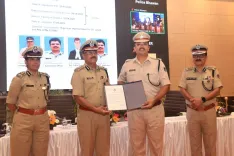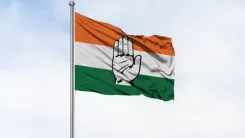How Does Digitisation Simplify Processes and Make Justice More Efficient? Insights from Ex-SC Judge Sanjay Kishan Kaul

Synopsis
Key Takeaways
- Case Pendency: An urgent issue requiring more judicial appointments.
- Judicial Appointments: The NJAC controversy continues to affect the process.
- Digitisation: A key tool for improving efficiency in the judiciary.
- Political Interference: Impacts the recommendation process for judges.
- Virtual Hearings: Enhance access to justice in urban settings.
New Delhi, July 15 (NationPress) In a candid conversation with IANS, Justice (retired) Sanjay Kishan Kaul, a former judge of the Supreme Court, discusses critical challenges facing the judiciary in India.
He addresses various topics, including long-standing vacancies, the National Judicial Appointments Commission (NJAC) issue, as well as digitisation, political interference, and changes in society, revealing systemic hurdles and potential reform strategies.
Interview Highlights:
IANS: What do you consider the most urgent concern in India’s judicial framework today?
Justice (retd) Sanjay Kishan Kaul: The primary challenge is the issue of case pendency. The solution lies in appointing a sufficient number of judges. We often fail to promptly address judicial vacancies, with nearly one-third of positions in High Courts unfilled, and this trend is worsening. While the Supreme Court isn’t facing this issue, lower courts are certainly affected.
IANS: What is your take on the National Judicial Appointments Commission (NJAC)?
Justice (retd) Sanjay Kishan Kaul: The NJAC was enacted by Parliament but later annulled by the Supreme Court. I believe the government has yet to fully accept this ruling. A timeline for appointments was established — I was part of that bench with Justices Bobde and Suryakant — but regrettably, it has not been adhered to. The issue has not even been addressed in the last 1.5 years.
IANS: Do you feel the Modi government has been supportive regarding judicial appointments?
Justice (retd) Sanjay Kishan Kaul: There are challenges. High Courts often hesitate to propose new candidates until prior recommendations are cleared. Regarding the government’s approach, I disagree — they approve some names but hold others back, which disrupts seniority. Consequently, some candidates have withdrawn. If this continues, it will be increasingly difficult to recommend capable lawyers as judges, as they may be reluctant to accept.
IANS: How do you assess the funding and infrastructure in the judiciary?
Justice (retd) Sanjay Kishan Kaul: While the Centre allocates funds, delays in their utilization lead to lapses. The scenario is inconsistent — some states boast excellent infrastructure while others lag significantly. We need to streamline processes, but simplification won’t suffice if a judge is overwhelmed with 100 cases daily. Digitisation is beneficial, yet not everyone can utilize it effectively, and many areas lack the necessary infrastructure.
IANS: Political parties frequently criticize the judiciary in public discussions. Does this influence the judicial system's functioning?
Justice (retd) Sanjay Kishan Kaul: Yes, it causes significant issues, particularly in the Supreme Court. Political disagreements ought to be resolved politically — courts are not venues for political disputes. Legal ramifications may arise, involving many individuals, complicating matters further. The courts must determine their jurisdiction. Institutions like the Election Commission exist for a reason — judicial intervention should occur only on clear legal grounds. The Supreme Court is not designed to formulate policies or perform duties assigned to other constitutional entities. We must maintain equilibrium.
IANS: What are your thoughts on the murder of tennis player Radhika Yadav?
Justice (retd) Sanjay Kishan Kaul: It conveys a profoundly negative message. Women’s empowerment is linked to societal advancement — they are now more educated and self-reliant. However, some from older generations struggle to accept this change. When disputes over a woman’s autonomy escalate to violence, it highlights a character failure. Our society has deep-rooted issues — people today seem less tolerant of differing views. We must strive for social transformation. Women will lead their lives on their own terms, not dictated by others.
IANS: What is your perspective on the controversy surrounding Justice Yashwant Varma?
Justice (retd) Sanjay Kishan Kaul: Understanding the process is crucial. The submitted report was meant to assist the Chief Justice — it didn’t involve cross-examination. If the Chief Justice deemed the material significant, an investigation should have ensued. Many questions remain unanswered — how much cash was involved, whose funds they were, the role of the fire department, and if a proper ‘panchnama’ was conducted. In impeachment cases, the government doesn’t play a direct role — MPs propose the motion, and a committee is established. However, in this instance, a formal FIR and investigation were essential to uncover the truth. A mere fact-finding report is inadequate for impeachment. The Chief Justice still retains the authority to mandate an inquiry.
IANS: What is your perspective on digitisation and virtual hearings in the judicial system?
Justice (retd) Sanjay Kishan Kaul: Digitisation is a commendable initiative, yet its execution is inconsistent. Some states have embraced it more than others. It streamlines processes and was particularly advantageous during the COVID-19 pandemic. Several Chief Justices have indicated that courts should continue operating in virtual formats. In a congested city like Delhi, with its traffic challenges and numerous tribunals, virtual hearings enhance access to justice.









